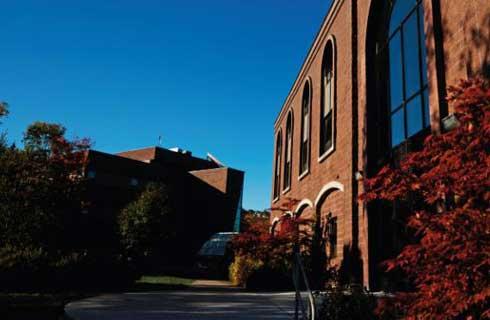理学学士(荣誉)生物化学和药物化学
BSc (Hons) Biochemistry and Medicinal Chemistry

学历文凭
Bachelor Degree with Honours

专业院系

开学时间

课程时长

课程学费

国际学生入学条件
30 to include Higher Level Chemistry at 6
ACCESS TO HE DIPLOMA REQUIREMENTS
Obtain Access to Higher Education Diploma with 122 UCAS Tariff points including a minimum of 30 Level 3 credits at Distinction in Chemistry related units.
IELTS - 6
TOEFL ibt - 79 (components - listening 19, reading 19, speaking 20, writing 19)
IDP—雅思考试联合主办方

雅思考试总分
6.0
- 雅思总分:6
- 托福网考总分:79
- 托福笔试总分:160
- 其他语言考试:Pearson Academic English - 50-57
CRICOS代码: CFR1
申请截止日期: 请与IDP联系 以获取详细信息。
课程简介
Study two interesting areas of science and enhance your scientific techniques and knowledge on our Biochemistry and Medicinal Chemistry BSc.<br><br>From unlocking the secrets of the human body to the individually tailored molecular therapies of the future, biochemistry is the study of biological processes at the cellular and molecular level. This is the foundation for understanding all biological processes, including the development and progression of diverse pathologies, across species. It has become the foundation for understanding all biological processes and can provide explanations for the causes of many diseases in humans, animals and plants.<br><br>Medicinal chemistry is aimed at students interested in working within the pharmaceutical sector. From understanding how pharmaceuticals interact with our bodies to exploring drug design to combat various diseases, the application of medicinal chemistry plays a vital part in prolonging and improving life.<br><br>Biochemistry modules cover five core themes: macromolecular structure-function, metabolism and its control, genetics, cell biology and the applications of chemistry in the study of these. The course will give you a broad and varied grounding in modern biochemistry. You will explore the structure and function of biological molecules and metabolic processes, core chemical concepts and their application to the biological sciences and molecular cell biology.<br><br>You will further develop skills in communicating to range of target audiences including producing a product information leaflet on an allocated drug or medication detailing key information on the structure, function and biological activity. These communication skills are further developed later in the course in a variety of formats, such as experimental project reports, literature reviews, research posters. The year concludes with our undergraduate student research conference where you will showcase the outcomes of your research project.<br><br>The medicinal chemistry element of the course provides you with a strong grounding in core areas such as the principles of drug design. This focusses on understanding the interaction of small molecules with biological targets in the body and applying this to the design of drug molecules. During practical sessions you will learn advanced experimental techniques including handling air-sensitive reagents, and also complete a multi-step synthesis of nalidixic acid (the heterocyclic core of a new class of antibacterial agents) to mimic the processes used in the pharmaceutical industry.<br><br>As you advance on this course modules will build on the knowledge you've acquired in the principles of drug design by looking at the mechanism of drug action. This follows the pathway of a drug substance through the body, looking at the key areas of pharmaceutics and pharmacokinetics.
相关申请
 预科
预科 奖学金
奖学金 实习机会
实习机会 在校学习
在校学习 跨境学习
跨境学习 校园授课-线上开始
校园授课-线上开始 在线/远程学习
在线/远程学习
开学时间&学费
学费信息仅供参考,请与IDP联系以获取详细信息
| 开学时间 | 时长 | 学费 | 地点 |
|---|
学校排名

世界排名501
数据源:
泰晤士高等教育世界大学排名
关于基尔大学

基尔大学是一所基于校园的大学,其学生课程满意度在英格兰排名并列第一(卫报2019年大学排行榜)。它位于莱姆河畔纽卡斯尔(Newcastle-under-Lyme)的大学城附近,靠近热闹的特伦特河畔斯托克市(Stoke-on-Trent),是学生的热门选择。基尔大学为拥有英国最大的单一校园而骄傲,大学拥有超过2.5平方公里的美丽乡村。基尔大学为学生提供了从基础水平到研究生研究水平的广泛课程选择,学科范围从环境科学到市场营销和媒体。大学拥有很高的就业率,在毕业后的六个月内96%的学生找到工作。基尔大学的学生来自120多个不同国家,构成了该大学的国际学生社区。这些学生努力让所有学生成为全球公民。该大学不仅是TEF金牌机构,目前还拥有200多个俱乐部和社团,大学鼓励学生参与充满活力的校园生活。这所自给自足的大学提供令人印象深刻的设施,包括一个让学生使用学习材料的24/7全天候图书馆,还有各种食品商店、健身房、舞蹈室、运动场和球场。它还为学生提供长期的笔记本电脑贷款,同时大学举办每周一次的农贸市场,并设有几家校园商店、学生会商店、邮局、银行、药房、医生诊所和书店。基尔大学为学生提供出色的残疾学生服务、毕业生服务和国际学生支持。还为所有人提供绝佳的职业建议、财务支持和保密咨询服务。有家人的学生还可以使用专门建造的托儿所。
本校相关课程

社会工作(荣誉)文学士学位
学历文凭
Bachelor Degree with Honours
开学日期
课程费用总额


理学士(荣誉)理学士
学历文凭
Bachelor Degree
开学日期
课程费用总额


MPharm(荣誉)药房
学历文凭
Bachelor Degree
开学日期
课程费用总额


MBChB(荣誉)医学
学历文凭
Bachelor Degree
开学日期
课程费用总额


理学士(荣誉)数学
学历文凭
Bachelor Degree with Honours
开学日期
课程费用总额


荣誉管理学士学位
学历文凭
Bachelor Degree with Honours
开学日期
课程费用总额

其他相关课程

理学学士(荣誉)生物医学
 德蒙福特大学
德蒙福特大学泰晤士高等教育世界大学排名:639
学历文凭
Bachelor Degree with Honours
开学日期
课程费用总额


理学硕士-分子和细胞生物学(研究)
 怀卡托大学
怀卡托大学学历文凭
Masters Degree (Research)
开学日期
课程费用总额


生物医学硕士
 奥克兰大学
奥克兰大学学历文凭
Masters Degree (Research)
开学日期
课程费用总额


MRes Cancer Biology
 诺丁汉特伦特大学
诺丁汉特伦特大学泰晤士高等教育世界大学排名:696
学历文凭
Masters Degree (Research)
开学日期
课程费用总额


理学学士(荣誉)生物医学
 布里斯托大学
布里斯托大学泰晤士高等教育世界大学排名:81
学历文凭
Bachelor Degree with Honours
开学日期
课程费用总额


PhD in Immunological and Cellular Strategies in Metabolic Disease (King's and Technische Universität Dresden)
 伦敦国王学院
伦敦国王学院学历文凭
Ph.D.
开学日期
课程费用总额










